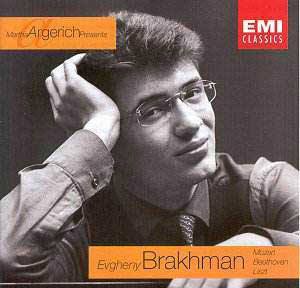As is the way with modern marketing, Argerich’s name
appears as boldly as Brakhman’s on this debut disc from yet another stunning
young Russian virtuoso. Fair enough; the record companies have to try
somehow to attract our attention to what is, after all, a recital of very
well trodden territory. In fact what strikes me, on initial acquaintance
with this artist, is playing of exceptional clarity and lucidity, light
years away from Argerich’s volatile impetuosity, perhaps more akin to
a young Perahia. In one so young (20 when this was recorded) this is admirable,
though it does have its drawbacks in music as emotionally wide-ranging
as some of the works here.
Brakhman’s slightly cool, detached but very musical
style of phrasing is probably best suited to the Mozart. This marvellous
sonata, published in 1784, is the most extrovert of a set of three,
and displays a brilliance and energy that would fully show off the young
Mozart’s keyboard skills. So it does with Brakhman, and the crystalline
clarity of his scales and ornaments are something to marvel at. The
finale’s triplet figurations and Alberti bass really are superbly steady
– any budding pianist will know just how deceptively difficult these
common classical devices really are.
Beethoven’s spuriously titled ‘Tempest’ sonata
is less completely successful. I like his pacing of the difficult first
movement, and his very precise placing of the syncopated sforzando
accents. The finale is also brought off well, with the tricky broken
chords at 2.43 well handled. The problem lies in the great slow movement,
which is a shade under-characterised. The drum-roll-like accompaniment,
for instance at 5.50, simply lacks mystery, and turning to some of the
competition is not particularly kind to Brakhman. Richard Goode, on
a highly recommendable Nonesuch cycle, manages to convey greater depth
and emotion in this profound music. Similarly, Solomon’s classic reading
on EMI is a model of spiritual insight. Still, there is much to enjoy
in the sheer unaffected nature of Brakhman’s performance, and at least
he does not impose his own ego on the music.
Liszt’s monumental one-movement B minor Sonata,
however, does need something of an ego to make it fully convincing.
What we get, once again, are the notes, pure and simple, and in the
many long, intensely personal passages in this piece, that is not enough.
The opening, once again, lacks any of the anticipation of a great journey
about to be undertaken. The technique is certainly secure, and the fabulous
double octaves towards the end are breathtaking in their precision and
bravura. But this is a forward-looking masterpiece, and the structure
and contrast need to be clearly defined. Of the many versions in my
collection, the current favourites are Zimerman (on DG), Argerich herself
(also on DG, at mid-price), and, best of all, Richter, on stunning form
and superbly coupled with the two concertos (mid-price Philips). It
may sound like a cliché, but I’m sure the wisdom of age and experience
do bring benefits in music such as this. Richter’s technique may be
fallible in places (it is live, and sounds un-edited), but such is his
grip on the extremes of contrast and mood changes within the chameleon-like
structure, that the listener simply has to submit and be a participant
until the very last note sounds, and the great circle is closed. This
is surely the mark of a great performance, though Brakhman’s musical
intelligence and technique are such that he will almost certainly reach
that standard one day.
So, all in all, much to admire, if ultimately falling
short of the very best, especially given the incredibly severe competition
in the Liszt and Beethoven. The recording is good, though so closely
balanced that the piano’s damper mechanism is clearly audible through
most of the recital.
Tony Haywood


